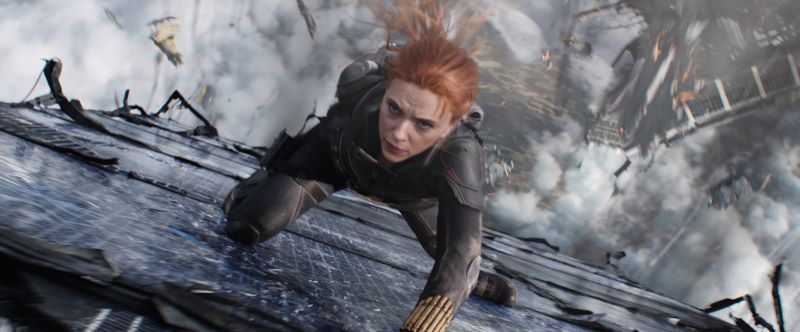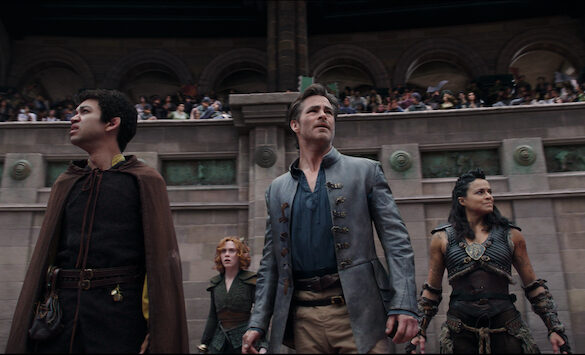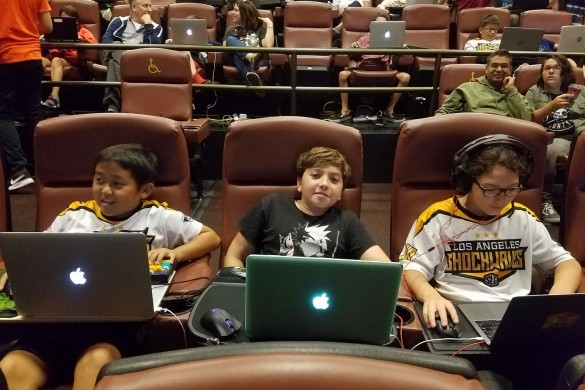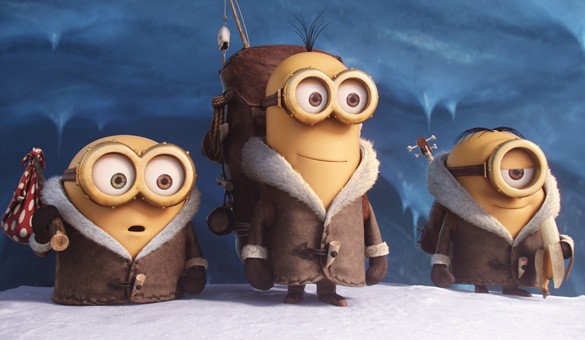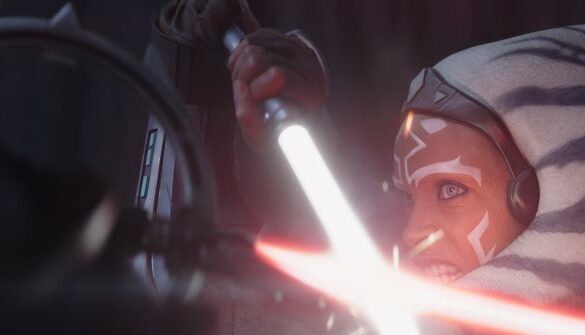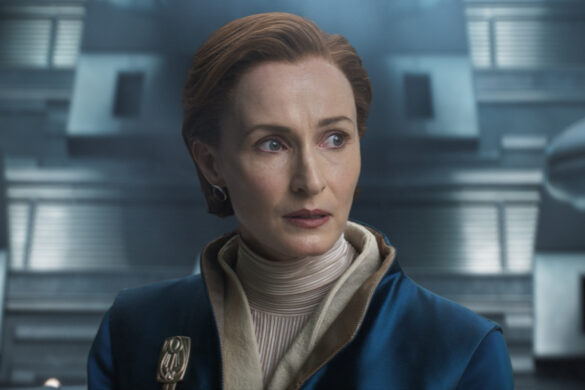For over a decade, Marvel Cinematic Universe captivated its fans with its interconnective standalone films, leading to cinematic blockbusters. And Scarlet Johansson’s Black Widow played a vital role in shaping the MCU into what it is now. But for a long time, the former spy and assassin turn Avenger played a supportive role to her male counterparts and hasn’t had a film to call her own.
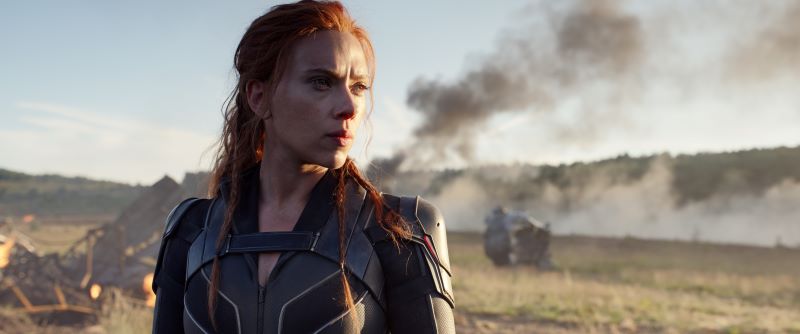
Until now. Despite Natasha’s fate in “Avengers: Endgame,” Marvel Studios turns back the clock to give its fans “Black Widow,” a prequel that explores traumatic history before she became an Avenger and acquaints them with her spy family and the Red Room program that created her.
Though Natasha already proved herself to be a valuable member of the Avengers through fearlessness, grit, determination, strength. But it took over a decade when she was first introduced in “Iron Man 2” for her to get her own film. Whether it was the story development or the studio politics, time was going to be against a film like “Black Widow.” The MCU had progressed for far that it would have been more difficult to find its place had they delayed the film any longer.
Considering how Natasha Romanoff operates within the MCU, it only makes sense that her standalone film functions as Marvel Studios’ espionage thriller. From the political thrillers of Captain America and fantastical Thor films to the John Hughes high school Spider-Man films and the space opera of the Guardians of the Galaxy, Marvel has constantly bent the genres with its superhero muscle. Although we know she meets her fate during “Avengers: Endgame,” placing “Black Widow” in between the events of “Captain America: Civil War” and “Avengers: Infinity War” avoids having to explain the title character’s return with something as derivative as a resurrection or cloning. Instead, we get a story that allows Natasha to come into her own and organically build to something that we could believe when we see her in “Avengers: Infinity War.”
Set shortly after the events of “Captain America: Civil War,” Natasha is on the run from the American government after violating the Sokovia accords by preventing King T’Challa from apprehending Captain America and The Winter Soldier. Now a fugitive, Natasha finds herself living in an anemic squaller until she can figure out her next move. Though it’s a small hideaway, it contains a mysterious counter agent to break Red Room agents free from their subjugation. But, as she ponders, she finds herself being pulled back into the world of spies and assassins when Taskmasker tries to assassinate her. And this is no ordinary assassin as they can mimic the moves of any of the Avengers, including herself.
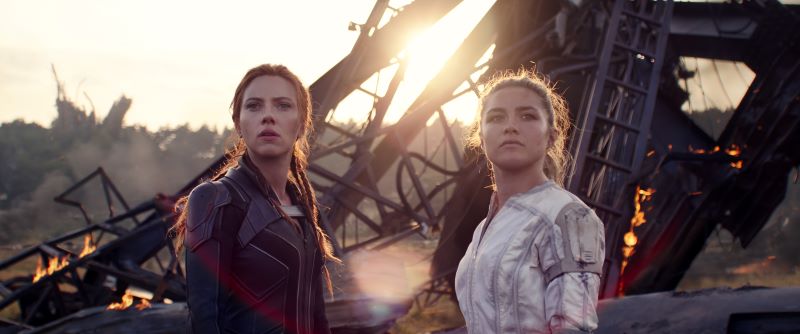
After being forcibly evicted, Natasha returns to Budapest in hopes of finding answers. But, instead, she engages in a violent family reunion with her younger sister Yelena (Florance Pugh). The latter broke free from her subjugation when she was exposed to a red counter agent from a Red Room defector. Though they eventually gain each other’s trust, they find themselves on the run once more as Red Room agents and Taskmaster hunt them down. And not even the power of two former Red Room agents can handle the deadly skull-faced assassin.
Now that the two have the counter agent that could help free Red Room assassins from their subjugation, they need to find the location of the Red Room to complete their mission. This means they must find the only people they know with connections to the red room, their surrogate parents. There’s the boisterous Alexi (David Harbour) and the kind Melena (Rachel Weisz). Earlier flashbacks depict the four living the picturesque happy family life in suburban Ohio. Unfortunately, it’s all stage as it was a means for the KGB to spy on the American government. It makes it that much harder to reconnect with Alexi and Melena because everything she knew as a child was a fabrication that ultimately led to her being betrayed by Alexi and indoctrinated into the Red Room by its leader, Dreykov (Ray Winstone).
While “Black Widow” is the Natasha’s first standalone film, it finds itself in a unique albeit strange place within the MCU’s grand scheme. It’s smaller in size and scope when compared to some of the other standalone films. But that isn’t a determent as it allows for a stronger introspective story to explore the emotional depths of the title character. And the psychological traumas of being raised in a spy family and the subjugation of the Red Room programming give fans a better understanding of why Natasha was so enigmatic and stoic.
Fans are used to seeing Natasha as a calm and collected Avenger who can keep her emotions in check, but “Black Widow” sees her out of her element as she is on her own without any sort of help. But Natasha has acted as a supportive crutch for her male counterparts in their respective standalone films and larger ensemble films. Any help from them would have taken away the meaning and value of seeing a female superhero do it independently.
“Black Widow” may be a long-overdue film, but because it is a film that takes place before her eventual death chronologically, it feels out of place and something that should have been released early on when the MCU was finding its success. The twists and turns don’t have as much impact because, ultimately, it won’t amount to much for Natasha. And it’s clear that the after-credit scene would have been more effective had “Black Widow” not been the victim of being postponed due to the pandemic.
Still, “Black Widow” gets the job done because it finally gives Natasha the film she deserves. Not only does she get to step out of her fellow Avengers’ shadow, but we get to see what made the character so intriguing. We get to see Natasha find the closure that has eluded her for so long through some physically brutal action sequences and more emotionally heavy exchanges. Because her past remained a mystery to many of us and was only revealed through comedic banter or vivid traumatic memories, the standalone gives audiences and fans a chance to see how she finds that closure.
The film takes away the tools and Avengers allies Natasha could trust and forces her to rely on her skills. But that can only get her so far. And if she intends to take bring down Drykov, she will need to reunite with the family she thought she left behind. That includes finding her sister, Yelena, who is just as deadly as he sister but also very much the youngest family as she has a habit of saying the wrong thing at the right time and calling them out for their faults. Pugh is a delightful presence in “Black Widow,” as her energy and humor provide many scene-stealing moments and adds much-needed levity to this post-Cold War espionage thriller. Yelena’s enthusiasm counters Natasha’s calm demeanor and stoicism, which helps give the film a nice balance of tones. At the same time, Yelena displays an emotional vulnerability that shows that even though she is a deadly assassin, she is still very much a human.
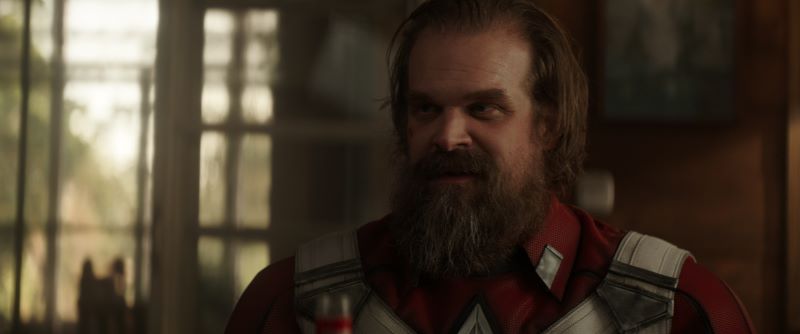
Then there’s the Judas father, Alexei Shostakov, who treated Natasha and Yelena as like there were his daughters but did nothing to protect them from Alexei is the glue that holds that idea of a family together. For all the spy lessons and devious betrayals, there lies a person who cared for Natasha and Yelena. His humor comes out of his ego that is built to defend against the overwhelming remorse he feels for turning his back on his family. So Alexei has to be bombastic and bloated, creating a number of prison stories to solidify his alpha status amongst his prison mates.
And finally, there’s Melina, a KGB female agent who underwent the Red Room programming five times but never made it out like her adoptive daughters. There is mistrust in the air whenever the four are together, but somehow they still remain a family as Melina scolds Natasha for her poor posture, and Yelena snaps back for at her for roping her into the conflict, while Alexei tells them both not to talk to their mother that way.
Of course, Natasha refuses to believe that their idea of family is real since everything she was raised on was a fabrication and a lie. Though that may be true, there is no denying that there is an emotional connection between the four of them. That is a terrifically warm familial bond that they share but also questioned because of their spy lifestyle. And yet, they can come to terms with the sins of their past for the common goal of bringing an end to the Red Room.
That quest is a brutal one. Again, we’ve seen how the male superheroes used their superhuman skills and high-tech weaponry to defeat the chief villain. But “Black Widow” takes Natasha’s tools and friends that she could trust away and forces her to rely on her strength and skills. Natasha has a unique way of fighting that doesn’t require the use of high-tech armor, a Vibranium shield, gamma strength, or a magic hammer. So, the action is more brutal and slightly bloody. Natasha is fighting the embodiment of the past as Taskmaster has acquired the moves of Captain America or Spider-Man, can shoot arrows like Hawkeye, and has retractable claws like Black Panther. And she also finds herself fighting the demons of her past, as she as she must find it within herself to forgive but not forget what her adoptive parents have done to her, all the while bringing down the monstrous and cold-hearted Drekov from kidnapping girls to join the Red Room.
Director Cate Shorthand, using a script written by a screenplay by Eric Pearson, based on a story written by Jac Shaffer and Ned Benson, balances out all the MCU action with the emotional beats with a deft hand. “Black Widow” is throwback to cold dark global espionage thrillers but with a Marvel twist. Though smaller in scale, it leaves an impact with impressive action set pieces – especially in that third act – and balances it out a strong and compassionate introspective story that explores Natasha’s trauma and her efforts to find closure she needs to move on from it. And the humorous spy family dynamics along with Pugh’s scene stealing performance as the deadly but also very fun Yelena adds a lightheartedness to the film. If anything, “Black Widow” is that long overdue film that is both a rousing kickoff to Phase 4 of the MCU and a perfect sendoff to a fan-favorite Avenger.
8/10

